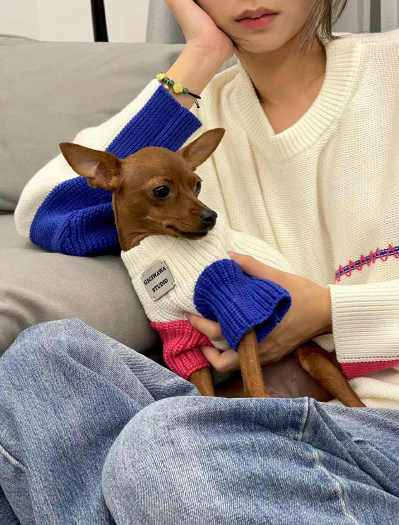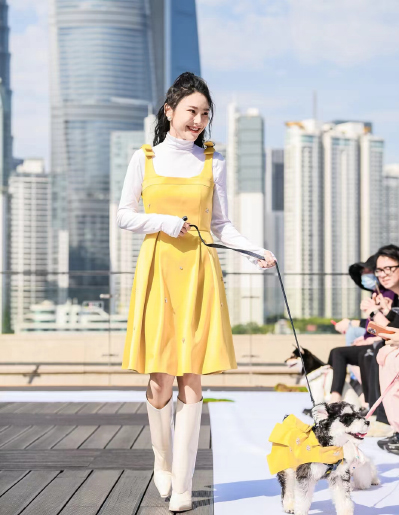| Lifestyle |
| A purrfect fit | |
|
|
 A dog owner and her fur baby wear matching sweaters (COURTESY PHOTO)
After going over her finances, Li Shiru realized she'd spent more on her furry companion than herself during last December's New Year-themed online shopping festival, founded by Chinese e-commerce behemoth Alibaba—owner of popular shopping platforms Taobao and Tmall. "I ordered a set of makeup brushes, three packs of cat food, a cute cloud-shaped bowl, a box of hair ornaments… and 23 outfits for my cat Dabing," Li told Beijing Review. "The total came to 8,986 yuan ($1,251), half my monthly income." Her cat's new clothes made up the biggest chunk of the bill. Li regularly takes her cat out for walks, and she ordered customized kitty outfits based on her own daily wardrobe from a pet shop on Tmall. Li was inspired by a few pet vloggers she follows. On Xiaohongshu, a wildly popular Chinese app that serves as a lifestyle bible and e-commerce platform, videos of such vloggers and their fur babies in matching outfits are some of the hottest. "These vloggers get very creative when it comes to dressing their pets. For example, I follow one girl who loves to bring her corgi to her gym sessions, and bought the dog matching yoga clothes. The video of them running together in matching outfits is adorable," Li said. In December 2023, Alibaba released a "Hot" consumption report, stating that the pet economy had reached a small peak this winter. During the New Year-themed shopping festival on Tmall, the sales of pet fashion products increased significantly, and the transaction volume of pet clothing increased by 50 percent year on year. Dressed to the nines In recent years, the flourishing pet-related businesses have attracted the attention of the fashion industry. Last October, Shanghai hosted China's first large-scale pet fashion week, bringing together 15 top pet clothing brands and hundreds of pet models. The event will take to the stage again in March to showcase the latest evolutions in this fast-growing industry. Lu Yangyang, a 30-year-old dog lover and founder of GIGIWAWA, a brand offering matching clothes for pets and their owners, said the fashion week demonstrated the blossoming of this emerging industry. "The fashion week included several events, such as a dress competition, a catwalk show and an open audition for 'best pet and owner duo.' I learned a lot from my colleagues and potential customers," Lu told Beijing Review. After graduating from college with a degree in fashion design, Lu stumbled into the burgeoning industry in 2020. "I wanted to buy a suit for my Pomeranian, but I couldn't find a satisfactory product," Lu recounted. "So I made one myself. Some pet owner friends saw it and loved it, and one thing led to another." To create a sense of community among her customers, and to attract new ones, Lu started organizing in-person activities of all kinds. "We invite pet owners to attend our monthly gatherings together with their furry companions, and activities such as handicraft workshops and themed parties are well received," Lu said. "Pet fashion is a rather new field, and there are challenges that have yet to be resolved. So I want to concretize and contextualize this relatively new concept by presenting potential customers with real-life, in-person scenes."  A dog owner shows her furry companion during an outdoor event hosted by GIGIWAWA, a brand offering matching clothes for pets and their owners, in Shanghai on May 2, 2023 (COURTESY PHOTO)
Personal branding Aside from wanting their pets to be dressed up to the nines, pet owners today also have many ambitious, all-round plans to make their fur babies look their very best, such as making sure they get in enough exercise and regular grooming, and even applying makeup. These elements, long associated with the concept of style in the human realm, are becoming trendy in the pet fashion industry along with pet apparel. Zhao Sijie is the manager of a store in Shanghai that now sells brushes for pet coat care and makeup application, which she said was definitely not the case a few years ago. She admitted that she wouldn't even have thought of it then. A 2021 report published by Djyanbao.com, a consulting agency, stated that the total volume of China's pet beauty industry that year was 17.1 billion yuan ($2.38 billion), with grooming and makeup brushes accounting for 32.6 percent of this market. iResearch, another consulting agency, revealed in 2021 that 87 percent of the pet owners it surveyed were willing to spend more on their pets' appearance. Zhao further explained that many pet owners today like to dab some eyeshadow and blush on their pets' faces to emphasize their cuteness. The makeup products they use are child and pet friendly—as usually stated on the packaging. "I have been working in this field for eight years. When I started here, the shop only sold basic items like carriers, pet food and medicine," Zhao told Beijing Review. However, this shop manager found herself having to answer increasingly meticulous questions from customers, including "What clothes do you recommend for my cat that will match her color?", "Is my baby too fat now? Is there anything he could wear to look slimmer?" and "What kind of 'hairstyle' would become her? Oh, then what kind of brush should I get?" "I'm not exactly a fashion consultant, but I had, and have, to learn about these things to keep up with the evolving market," Zhao said, adding that pet owners are going out of their way to make their pets look good—both for social and emotional reasons. "Owners mention how they like to bring their pets to gatherings with friends or colleagues, and pets' appearances are part of their 'personal image management;' plus, building up their pets' image makes them feel happy," Zhao said. Experts have attributed the diversified and growing trends of the pet economy to people's changing feelings toward their pets. Wu Daiqi, CEO of Siqisheng Communi-cation Corp., believes that an owner's emotional attachment to their pets leads to increased and diverse spending. "Owners now take their pets' living standard seriously and are willing to spend money not only on basic products like food, but also on other advanced products in different fields, including education, beauty and health," Wu told Beijing Business Today newspaper. According to the 2021 White Paper on China's Pet Industry, 85.1 percent of pet owners consider their pets family, and 8.5 percent consider them friends. And these owners do indeed treat them accordingly—by spending more on them. Lu has observed her clientele's need to create a sense of family with their pets, and to make the pets' clothing match that of their owners, she keeps up with the latest trends by taking notes from major international fashion weeks and reading fashion magazines and reports. "It's important for me to keep my finger on the pulse of the 'human fashion market.' That way I can meet the needs of the majority of my customers," Lu said. As far as Li is concerned, Dabing is her best friend. Dabing came into Li's life two years ago, when she moved to Beijing for work, and she didn't expect the cat to actually "do anything" for her. "I don't mind spending money on her," Li said. "I have so much fun spending time with her. She gives me all these wonderful, emotional gifts that are basically reimbursements for the money I spend on her." Copyedited by Elsbeth van Paridon Comments to zhangyage@cicgamericas.com |
|
||||||||||||||||||||||||||||
|
